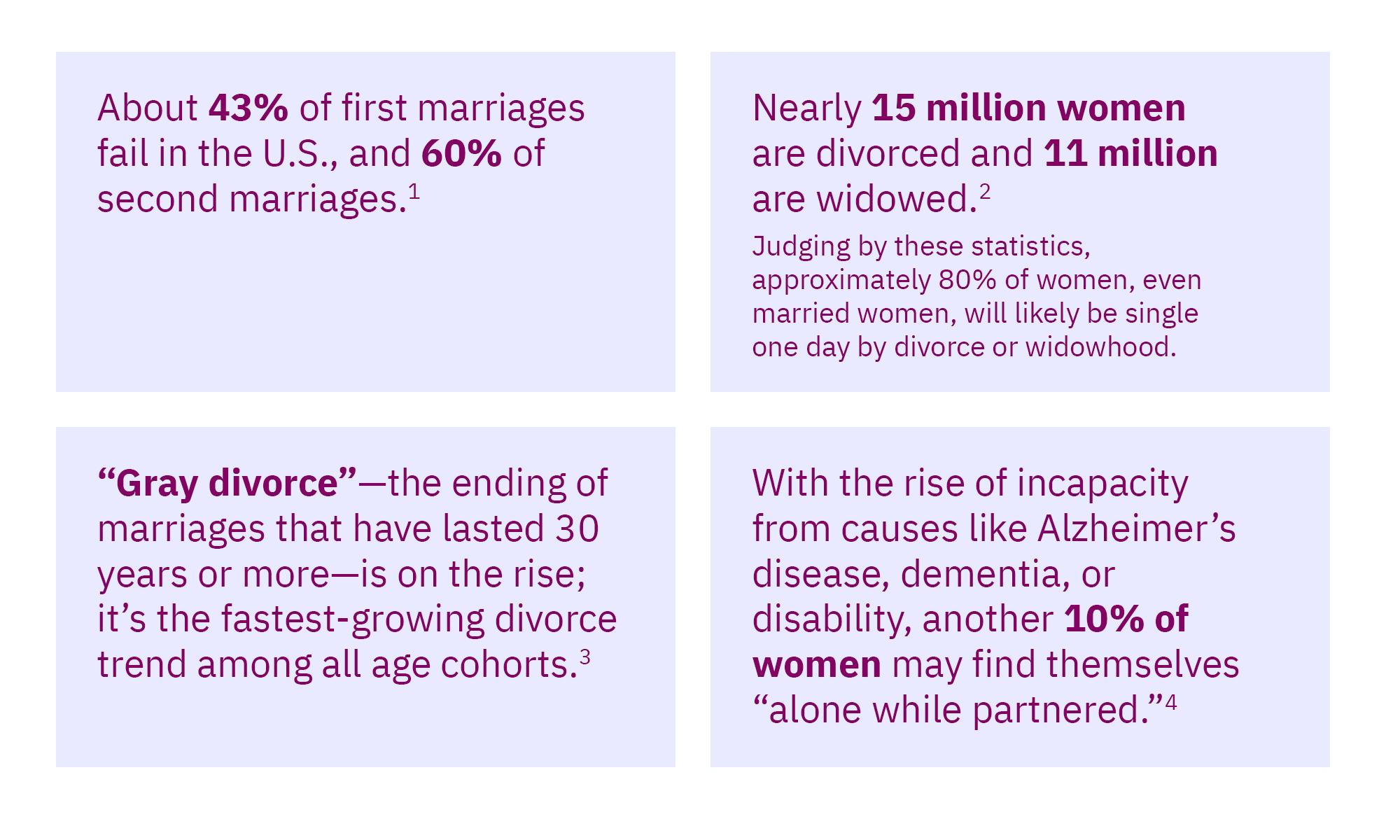Ready to learn more?

Home » Insights » Personal Finance » Financial Advice for Suddenly Single Women: How to Feel Empowered
Kimberly Foss, CFP®, CPWA®
Sr. Wealth Advisor
Take steps to understand your finances and feel empowered if you are, or could become, a single woman through death or divorce.

Since the odds are high that most women will likely become single at some point in their lives, even if currently married, it’s crucial to take the time to understand your finances.
What can you do to empower yourself if you’ve become, or could become, solely responsible for your finances? And how can you feel confident in managing this critical part of your life?
If you aren’t single now, it’s important to be proactive before a life-changing event occurs (like divorce, death of a spouse, or a major health diagnosis). Having a good handle on your assets and expenses while life is going smoothly can provide reassurance in times of stress.
One of the first steps is reviewing your estate plan and updating it as appropriate. It’s not ideal to discover after a major life event that your current intentions and wishes are not included in your estate plan documents. And be sure to review your estate plan at least once a year.

Financial advice for widows
Because losing your spouse is an emotionally tough time, managing financial tasks may feel almost impossible. In addition to consulting with your wealth advisor, ask for help from a trusted family member or close friend. To make it help easier for them to aid, consider taking the following steps:
Financial advice for divorcées
Like losing a spouse to death, it can be emotionally draining and painful to go through a divorce. But it can also be more challenging if you and your spouse don’t agree on how money should be handled, either during the marriage or the divorce process. Take the following important steps to prepare and help protect yourself:
You got this
Whether you’re currently trying to navigate a difficult change in your life or want to be prepared for one, the time you invest to understand your finances is a gift to you — and your loved ones — that will keep on giving. Especially if you have daughters, it’s an opportunity to lead by example and show them how to take control of their financial independence. Share the knowledge you gain and have open communication with them to help with their feelings of empowerment, as well.
Use your wealth advisor as a resource. He or she can help you understand your financial situation and run through “what-if” scenarios to aid in getting you comfortable with your finances. And whatever the future may bring, your advisor can also help with evolving and adapting both your financial plans and estate plans.
Understanding and taking control of your finances will help with feeling assurance and making good decisions as your life goes through changes, whether you’re a suddenly single woman or become one in the future.
If you are not a Mercer Advisors client and would like to increase your financial knowledge and confidence so you can handle life’s challenges as a single woman, let’s talk.
1. “Revealing Divorce Statistics in 2024,” Forbes Advisor, May 30, 2024.
2.“Marital status of the United States population in 2022,” Statista, Aug. 29, 2023.
3.“Gray Divorce Is Skyrocketing,” Forbes, May 7, 2024.
4.“Dementia & Alzheimer’s Disease Statistics and Facts,” The Center for Advancing Health, Jan. 11, 2024.
Mercer Advisors Inc. is a parent company of Mercer Global Advisors Inc. and is not involved with investment services. Mercer Global Advisors Inc. (“Mercer Advisors”) is registered as an investment advisor with the SEC. The firm only transacts business in states where it is properly registered or is excluded or exempted from registration requirements.
All expressions of opinion reflect the judgment of the author as of the date of publication and are subject to change. Some of the research and ratings shown in this presentation come from third parties that are not affiliated with Mercer Advisors. The information is believed to be accurate but is not guaranteed or warranted by Mercer Advisors. Content, research, tools and stock or option symbols are for educational and illustrative purposes only and do not imply a recommendation or solicitation to buy or sell a particular security or to engage in any particular investment strategy. For financial planning advice specific to your circumstances, talk to a qualified professional at Mercer Advisors.
Certified Financial Planner Board of Standards, Inc. (CFP Board) owns the CFP® certification mark, the CERTIFIED FINANCIAL PLANNER® certification mark, and the CFP® certification mark (with plaque design) logo in the United States, which it authorizes use of by individuals who successfully complete CFP Board’s initial and ongoing certification requirements.
